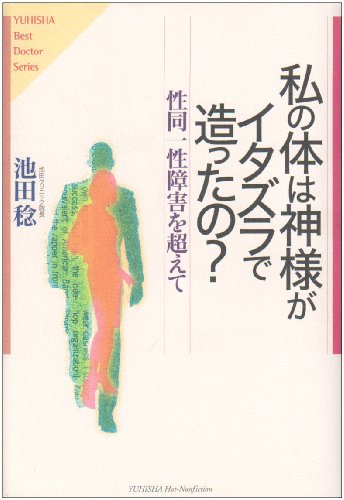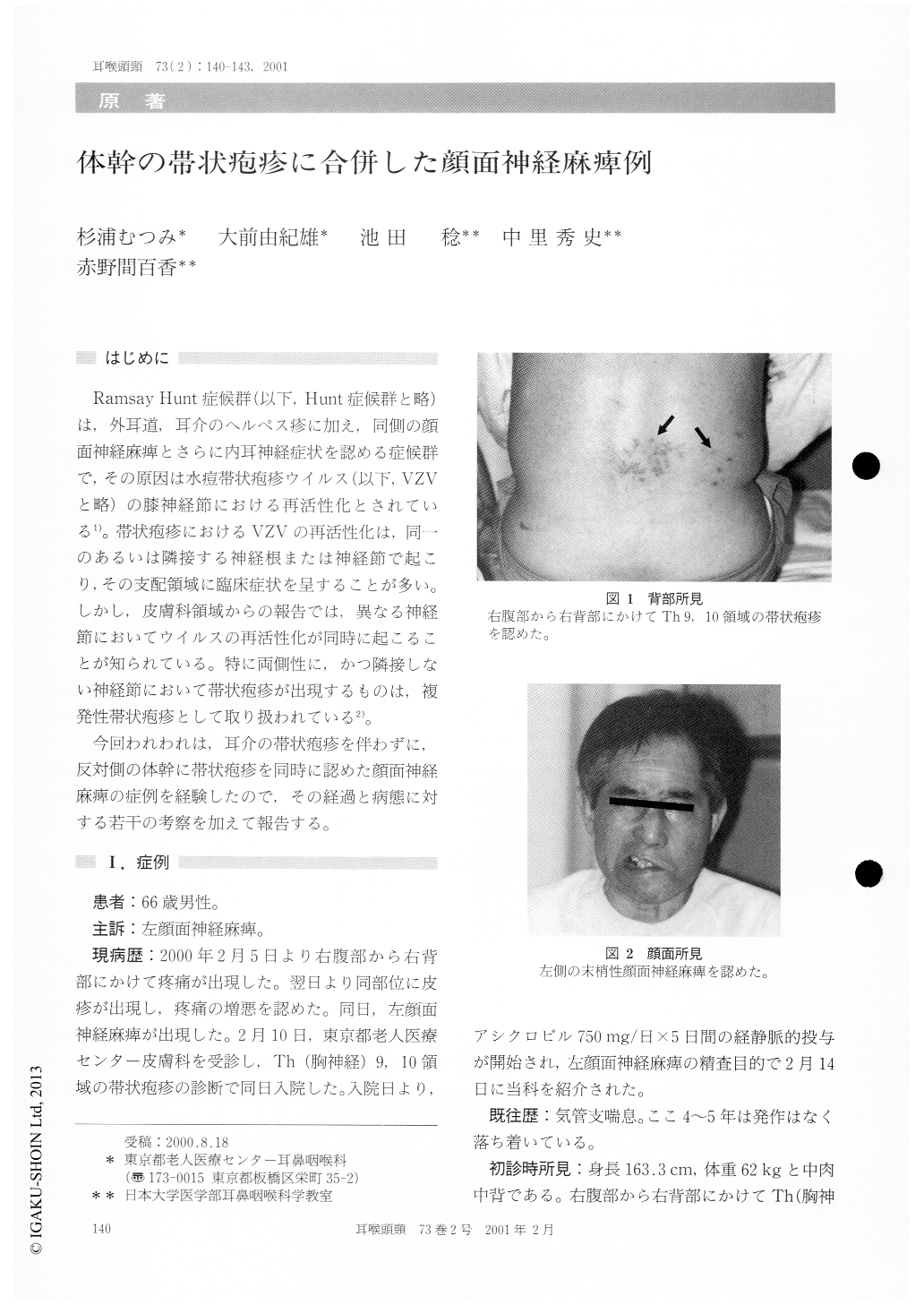9 0 0 0 OA 日本人における正常ヒト耳介の計測学的検討
- 著者
- 伊藤 勇 池田 稔 末野 康平 杉浦 むつみ 鈴木 伸 木田 亮紀
- 出版者
- The Oto-Rhino-Laryngological Society of Japan, Inc.
- 雑誌
- 日本耳鼻咽喉科学会会報 (ISSN:00306622)
- 巻号頁・発行日
- vol.104, no.2, pp.165-174, 2001-02-20 (Released:2010-10-22)
- 参考文献数
- 19
- 被引用文献数
- 2 9
日本人の耳介に関する計測学的研究の多くは1950年代までに報告されており, それ以降, 本邦における耳介の加齢変化についての詳細な計測学的な検討はほとんど行われていない. 今回, 当時よりも体格が向上し, また, 高齢化の進んだとされる現代日本人の耳介形態について, 乳児から高齢者までの幅広い齢層における詳細な計測学的検討を行ったので報告する. 対象は, 0歳から99歳までの日本人1958名 (女性992名, 男性966名) で, 耳長, 耳幅, 耳介付着部長, 耳介軟骨長, 耳垂長, 耳指数, 耳垂指数, 耳長対身長指数, および耳介の型について検討した. 各計測値はほぼすべての年齢群において男性の方が女性よりも大きく, 10歳代までの年齢群に見られる成長によると思われる急激な計測値の増加傾向に加え, それ以降も高齢者群になるに従い加齢変化によると思われる有意な増加傾向を認めた. 各指数, 耳介の型についても同様に成長によると思われる変化と加齢によると思われる変化を認めた. また, 以前の日本人の耳介を計測した報告に比べて耳介計測値の多くが大きくなっていた.今回の計測学的研究は現代日本人の耳介の大きさについて成長や加齢による変化を検討したものであり, 今後, 日本人の耳介形態についての一つの指標になるものと考える.
6 0 0 0 私の体は神様がイタズラで造ったの? : 性同一性障害を超えて
5 0 0 0 OA 舌痛症の機序とその対応
- 著者
- 池田 稔 生井 明浩 佐藤 正美 野村 泰之
- 出版者
- 耳鼻咽喉科展望会
- 雑誌
- 耳鼻咽喉科展望 (ISSN:03869687)
- 巻号頁・発行日
- vol.51, no.4, pp.208-214, 2008 (Released:2009-11-19)
- 参考文献数
- 6
Burning tongue syndrome is a collective name for diseases that cause a burning pain of the tongue, however, no clear clinical or laboratory abnormalities may be observed. The pain is a superficial, described as a burning sensation, and may occur in the tongue, palate, lips, buccal mucosa, gingiva, and teeth. Seventy-five percent of patients with burning tongue syndrome are middle aged women in their 50's and they are often post-menopausal. However, this syndrome may be observed in all ages regardless of gender. A variety of pathological causes have been proposed for this mysterious syndrome.Pain can be classified as nociceptive, neuropathic, or psychogenic, and the mechanism for the onset of burning tongue syndrome has been investigated in relation to all of these. Pain can be classified as acute or chronic. While acute pain may be alleviated with rest or analgesics, chronic pain lasts beyond a reasonable time needed for healing of an acute disease or wound and it may overlap with psychogenic pain. Many cases of burning tongue syndrome have been classified as chronic pain (psychogenic pain).Marked inflammation or tissue damage in burning tongue syndrome that are sufficient to account for the pain have not been detected. However, mild glossitis, micro-trauma caused by dentures, and dry mouth are often observed. Therefore, burning tongue syndrome may result from chronic pain caused by chronic irritation to the nociceptor in these minor lesions. In recent years, burning tongue syndrome has been proposed to be a neuropathic pain of the lingual nerve involving a taste disorder.Since the causes and background factors of burning tongue syndrome are not obvious, multiple treatments exist. The cases with dry mouth are treated with oral drugs such as pilocarpine hydrochloride, to promote salivation. For cases with taste disorder, zinc therapy using polaprezinc has been effective. For cases with suspected non-organic pain, anti-anxiety drugs or anti-epileptics, such as benzodiazepine, are recommended. The anti-epileptics, Rivotril® and Landsen®, enhance the GABA neuron activity specifically and are considered to be effective for neuropathic pain in burning tongue syndrome. For cases with masked depression, tetracyclic antidepressants or SSRIs are recommended. Patients with masked depression may have physical complaints and autonomous neurological symptoms, while the symptoms of depression are inconspicuous. Therefore, they have some common characteristics with patients with burning tongue syndrome.
4 0 0 0 義足足部に吸収および放出されるエネルギー量
- 著者
- 江原 義弘 別府 政敏 野村 進 國見 ゆみ子 池田 稔 高橋 茂 丸田 耕平
- 出版者
- Japanese Society of Prosthetics and Orthotics
- 雑誌
- 日本義肢装具学会誌 = Bulletin of the Japanese Society of Prosthetic and Orthotic Education, Research and Development (ISSN:09104720)
- 巻号頁・発行日
- vol.18, no.2, pp.152-158, 2002-04-01
- 参考文献数
- 11
- 被引用文献数
- 4
下腿切断者を被験者として, 16種類の足部について歩行時に足部に吸収・放出されるエネルギー量を計算した. 歩行中の関節位置と床反力データより関節モーメントを計算し, 関節角速度と体節間浸透力を考慮した新しい方式でパワーを計算した. 立脚期におけるパワーは負・正・負・正の4領域となり, おのおのの領域でパワーを積分してエネルギーを求めた. 踵部での吸収が少ない群としてはスプリングライトII, フレックスウォークII, グライジンガープラス, カーボンコピーII, 1H38, SL1020があり, 多い群としてはSACH, 1D10, SAFEIIがあった. 前足部での吸収・放出が少ない群としてはSACH, 1H38であった. 多い群はエナジーマルチ, シュアーフレックス, J-フットであった. 踵部と前足部の機能は足部を選択する場合に重要であることが示唆された.
- 著者
- 大澤 隆男 古谷 純 池田 稔 熊谷 健太
- 出版者
- 一般社団法人 日本デザイン学会
- 雑誌
- デザイン学研究 (ISSN:09108173)
- 巻号頁・発行日
- vol.65, no.3, pp.3_33-3_42, 2019-01-31 (Released:2019-03-25)
- 参考文献数
- 16
国内電機メーカは需要の変化に伴い事業戦略の見直しが進んでおり,企業内デザイン組織はその対応からより適切なデザイン価値の提供が求められている。日立製作所デザイン本部は製品価値を高めるプロダクトデザインから,ユーザの経験価値を高めるエクスペリエンスデザインへとデザイン価値を向上させる組織改革を進めてきた。 本稿は2005年から2010年に行った日立製作所のデザイン改革を「Will:組織の思い」「Must:組織の義務」「Can:組織の技量」からなる枠組みで整理した。「Will:組織の思い」では危機意識から将来ビジョンを描き実現の行程を共有し,「Must:組織の義務」で事業ニーズと成果評価を分析しデザイン満足度を上げ,「Can:組織の技量」で経験価値を創出するデザイン基盤を整備した。これ等の活動でデザイン本部は技術ポートフォリオを変え,B2B事業の貢献を高め顧客協創によるイノベーション創出を担う組織に変貌した。本事例から電機メーカのデザイン組織改革におけるWMCモデルのフレームワークの有効性を考察した。
4 0 0 0 セックス回数の数え方(第1報)
- 著者
- 池田 稔 池田 景子
- 出版者
- 日本性科学会
- 雑誌
- 日本性科学会雑誌 (ISSN:13496654)
- 巻号頁・発行日
- vol.29, no.1, pp.59-67, 2011-07
3 0 0 0 OA 男性用性的欲求尺度(SDS-M)の作成と信頼性・妥当性の検討
- 著者
- 田口 真二 桐生 正幸 伊藤 可奈子 池田 稔 平 伸二
- 出版者
- 日本犯罪心理学会
- 雑誌
- 犯罪心理学研究 (ISSN:00177547)
- 巻号頁・発行日
- vol.45, no.1, pp.1-13, 2007 (Released:2018-06-30)
- 参考文献数
- 27
A projective questionnaire for measuring male sexual desire was developed. In Study 1, the original Sexual Desire Scale for Males (SDS-M) was developed by referring to information on sexual activities on the Internet, as well as to prior studies on sexual offenders and their victims. The original SDS-M requested participants to judge whether they agreed or disagreed with sentences regarding various sexual behaviors and objects of sexual desire. SDS-M did not inquire about the frequency of sexual activities or the strength of sexual desire. The original SDS-M was administered to 140 males. The factor analysis of their responses revealed that the SDS-M had a 5-factor structure: daily sexual desire, h omo-hetero sexual desire, penis oriented sexual desire, intercourse oriented sexual desire and abnormal sexual desire. Cronback's alpha indicated satisfactory internal consistency and reliability. Study 2, investigated the stability and the validity of the SDS-M. It was administrated to 274 males, and based on the results of confirmatory factor analysis using Structural Equation Modeling, the SDS-M was divided into two subscales: a general sexual desire subscale consisting of the four factors with the exception of the Abnormal factor, and an Abnormal sexual desire subscale. The goodness of fit index of each subscale indicated satisfactory factor validity. Moreover, the SDS-M had reasonable test-retest reliability and satisfactory correlations with the Sexual Attitudes Scale and the Beck Depression Inventory.
3 0 0 0 OA 味覚障害患者に対するビタミンB2内服療法
- 著者
- 生井 明浩 池田 稔 土肥 二三生 吉川 琢磨 木田 亮紀
- 出版者
- 日本口腔・咽頭科学会
- 雑誌
- 口腔・咽頭科 (ISSN:09175105)
- 巻号頁・発行日
- vol.12, no.3, pp.369-372, 2000-06-01 (Released:2010-06-28)
- 参考文献数
- 5
- 被引用文献数
- 1
味覚障害の原因には, 従来より亜鉛が重要と考えられているが, 亜鉛の内服では味覚障害の改善の認められない症例がある.亜鉛と同様生体内の必須微量元素であるビタミンB群に着目し, 味覚障害患者の血中ビタミンB1とB2の測定を行った.対象は, 味覚障害患者のうちの血清亜鉛値正常者43例 (30歳―77歳, 平均59.7歳.男性17名, 女性26名) であった.43例全例血中ビタミンB1値は正常であった.43例中17例 (39.5%) に血中総ビタミンB2値の低下を認めた.低下症例の平均は44.4±3.8ng/ml, 全症例の平均53.8±12.4ng/mlであった (正常値50―84ng/ml).総ビタミンB2値の低下を認めた17例中10例に活性型ビタミンB2 (FAD) の経口投与を行った.10例中6例 (60%) に味覚の改善を認めた.味覚障害にビタミンB2欠乏も関与している可能性が推察された.
3 0 0 0 OA 加齢と味覚障害
- 著者
- 池田 稔
- 出版者
- 日本口腔・咽頭科学会
- 雑誌
- 口腔・咽頭科 (ISSN:09175105)
- 巻号頁・発行日
- vol.25, no.2, pp.133-138, 2012 (Released:2012-08-25)
- 参考文献数
- 18
味覚障害による受診患者数は年齢とともに増加し, 最近では60歳代に受診者数のピークがみられる. 特に, いわゆる65歳以上の高齢者の症例が増加しており, 本疾患は高齢化社会の進む中で今後も症例の増加が予想される. この高齢者の味覚障害の背景には味覚器の数や形態に対する加齢の影響も関与しているものと思われるが, それに加えて, 唾液分泌機能の低下や義歯使用などの口腔環境の変化, 全身疾患とそれに対する服用薬剤の影響など, 幾つかの重要な因子が高齢者の味覚障害の発現には関与しているものと考えられる. 味覚障害の治療は亜鉛内服治療が中心となるが, その有効性は高齢者においても変わらない.
2 0 0 0 OA 軟口蓋の味覚
- 著者
- 池田 稔
- 出版者
- 日本口腔・咽頭科学会
- 雑誌
- 口腔・咽頭科 (ISSN:09175105)
- 巻号頁・発行日
- vol.1, pp.17-24, 1989-04-30 (Released:2010-06-28)
- 参考文献数
- 18
2 0 0 0 OA 味覚障害の原因
- 著者
- 平井 良治 池田 稔
- 出版者
- 日本口腔・咽頭科学会
- 雑誌
- 口腔・咽頭科 (ISSN:09175105)
- 巻号頁・発行日
- vol.25, no.1, pp.1-5, 2012 (Released:2012-07-27)
- 参考文献数
- 45
現代社会は高い生活の質を要求し, 高齢化社会に伴って高齢者に多発する味覚障害患者は増加するものと推測されている. それに伴い味覚障害の診療の重要性が高まっている.現在まで味覚障害の原因は, ある程度検討され解明されている領域もあるが, 依然解明されていないものも多々存在する. よって, 味覚障害の診療で, 原因を確実に同定することは容易でなく, ガイドラインを作成することは繁雑な診療の一助になると考えられる.ガイドラインの作成に向けて本稿では, 味覚障害の発症に関与する因子としてこれまでに比較的よく検討が進められているミネラルの欠乏による味覚障害, 薬剤性味覚障害, 全身疾患に伴う味覚障害について述べる.
2 0 0 0 OA 顔面神経麻痺の発症における肉体的•心理的ストレスの関与の検討
- 著者
- 久我 むつみ 池田 稔 久木元 延生 安孫子 譲
- 出版者
- The Oto-Rhino-Laryngological Society of Japan, Inc.
- 雑誌
- 日本耳鼻咽喉科学会会報 (ISSN:00306622)
- 巻号頁・発行日
- vol.101, no.11, pp.1321-1327, 1998-11-20 (Released:2008-03-19)
- 参考文献数
- 12
- 被引用文献数
- 4 5
本研究は顔面神経麻痺の発症と肉体的および精神的ストレスの間に,何らかの関連性が存在するか否かを検討することを目的に行われた.対象は発症7日以内に日本大学医学部附属板橋病院耳鼻咽喉科外来を受診した顔面神経麻痺患者55例(男性23例,女性32例):Bell麻痺32例,Ramsay Hunt症候群23例である.初診時に麻痺発症前の1週間に肉体的あるいは精神的ストレスが存在していたかを問診した.また精神的ストレスに関して,新名の心理的ストレス反応尺度(Psychologi-cal Stress Response Scale 50 Items Revised:以下PSRS-50R)に従った問診も行った.肉体的あるいは精神的ストレスの有無についての問診では52例の症例で回答が得られた.麻痺発症前の1週間に肉体的疲労を感じていた症例は76.9%(40/52例)と高く,肉体的ストレスと顔面神経麻痺の発症の間には何らかの関連性が存在する可能性が推察された.一方精神的ストレスを有していたと回答した症例は51.9%(27/52例)であった.またPSRS-50Rによる精神的ストレスに関する問診の結果では,顔面神経麻痺患者の発症前の心理的ストレスレベルが非常に高いという結果は得られなかった.初診時の麻痺の程度と麻痺の経過および予後に影響を与える因子について,肉体的•精神的ストレスに関する問診結果を含めて重回帰分析を行った.その結果,発症前に肉体的疲労を有していたと回答した症例の方がNETが異常値を示しやすく,神経障害程度が高度であるという結果が得られた.
1 0 0 0 OA Reifenstein症候群の1例
- 著者
- 宗 祐人 小山 洋一 中林 正一 八尾 恒良 佐々木 悠 池田 稔 二宮 健
- 出版者
- 一般社団法人 日本内科学会
- 雑誌
- 日本内科学会雑誌 (ISSN:00215384)
- 巻号頁・発行日
- vol.79, no.8, pp.1083-1084, 1990-08-10 (Released:2008-06-12)
- 参考文献数
- 3
多くの内分泌疾患が受容体異常症の概念で捉えられ注目されている.症例は20才男子.著明な女性化乳房,尿道下裂手術既往,染色体46XY,血中テストステロン, 5αジヒドロテストステロン,エストラジオール高値, LH・RH負荷正常,睾丸生検組織像などよりアンドロゲン不応症のReifenstein症候群と考えられた1例を報告した.本症の本邦報告例は十数例を認めるに過ぎない.
- 著者
- 池田 稔 大澤 隆男 熊谷 健太 古谷 純
- 出版者
- 一般社団法人 日本デザイン学会
- 雑誌
- デザイン学研究 (ISSN:09108173)
- 巻号頁・発行日
- vol.67, no.3, pp.3_29-3_38, 2021-01-31 (Released:2021-02-20)
- 参考文献数
- 4
本稿は,日立製作所が2005年から2007年に実施した,多様な製品群を対象としたデザイン言語開発の枠組みについて述べるものである。そのプロセスや成果について具体的な実施例を示しながら報告することで,その有用性と展開の可能性について考察するものである。ここで扱うデザイン言語とは、製品の色彩や造形の表現を対象とする。 デザイン言語開発の枠組みは,大きく3つの活動から成っている。一つ目は、複数のデザイン言語開発を、一貫した考え方に基づいて行うためのデザインフィロソフィーの設定である。二つ目は、ユーザーの視点に基づいた製品カテゴリーの再分類である。三つ目は、前述2つの活動を踏まえた、具体的なデザイン言語の開発である。これらの活動をまとめ、デザイン言語開発の枠組みとした。本報告では、この枠組みについて詳しく述べるとともに、実際にそれを活用して行った生活家電製品とATMのデザイン開発の事例を紹介する。
1 0 0 0 体幹の帯状庖疹に合併した顔面神経麻痺例
はじめに Ramsay Hunt症候群(以下,Hunt症候群と略)は,外耳道,耳介のへルペス疹に加え,同側の顔面神経麻痺とさらに内耳神経症状を認める症候群で,その原因は水痘帯状疱疹ウイルス(以下,VZVと略)の膝神経節における再活性化とされている1)。帯状疱疹におけるVZVの再活性化は,同一のあるいは隣接する神経根または神経節で起こり,その支配領域に臨床症状を呈することが多い。しかし,皮膚科領域からの報告では,異なる神経節においてウイルスの再活性化が同時に起こることが知られている。特に両側性に,かつ隣接しない神経節において帯状疱疹が出現するものは,複発性帯状疱疹として取り扱われている2)。 今回われわれは,耳介の帯状疱疹を伴わずに,反対側の体幹に帯状疱疹を同時に認めた顔面神経麻痺の症例を経験したので,その経過と病態に対する若干の考察を加えて報告する。
1 0 0 0 OA 両側の水平共同注視運動麻痺と語音明瞭度の低下をきたした橋出血の1例
- 著者
- 増田 毅 鴫原 俊太郎 野村 泰之 齋藤 雄一郎 鴫原 じゅん子 肥田 和恵 辻 賢三 池田 稔
- 出版者
- 一般社団法人 日本めまい平衡医学会
- 雑誌
- Equilibrium Research (ISSN:03855716)
- 巻号頁・発行日
- vol.67, no.2, pp.121-129, 2008 (Released:2008-05-29)
- 参考文献数
- 18
Brainstem disorders are often characterized by abnormal eye movements, however, the type of abnormal movements vary depending on the localization and severity of the damage. Here, we report a case of pontine hemorrhage who exhibited horizontal conjugate gaze palsy and disorder of speech discrimination. The 34-year-old man presented with eye pain and dull feeling malaise?, disorder of speech articulation and torpor paralysis ?? of the left side of the body of sudden onset, that developed while he was driving a car. Clinical examination revealed horizontal conjugate gaze palsy, both rightward and leftward, while vertical gaze and convergence were normal. Although the pure-tone audiogram and DPOAE were within normal range, ABR showed prolongation of latency, and reduction of speech discrimination was recognized. MRI revealed evidence of hematoma and edema extending from the mid-dorsal aspect to the right side of the pons. Based on the findings, the patient was diagnosed to have pontine hemorrhage due to hypertension affecting the right facial nerve nucleus, right pyramidal tract, bilateral abducens nuclei, MLF, PPRF and the auditory neural pathway. Although the symptoms of pyramidal tract and auditory disorder resolved by day 19 when he was?? moved to another hospital, the other neurological symptoms were persistent.
1 0 0 0 OA 聴神経腫瘍定位放射線治療後の長期聴力変化
- 著者
- 鴫原 俊太郎 野村 泰之 平井 良冶 増田 毅 野口 雄五 浅川 剛志 亀井 知春 池田 稔
- 出版者
- 一般社団法人 日本聴覚医学会
- 雑誌
- AUDIOLOGY JAPAN (ISSN:03038106)
- 巻号頁・発行日
- vol.54, no.5, pp.575-576, 2011 (Released:2013-12-05)
1 0 0 0 OA リチウム電池食道異物の1症例と実験的研究
- 著者
- 吉川 琢磨 生井 明浩 池田 稔 木田 亮紀
- 出版者
- The Oto-Rhino-Laryngological Society of Japan, Inc.
- 雑誌
- 日本耳鼻咽喉科学会会報 (ISSN:00306622)
- 巻号頁・発行日
- vol.100, no.8, pp.864-869, 1997-08-20 (Released:2010-10-22)
- 参考文献数
- 21
- 被引用文献数
- 4 1
小児の異物誤飲事故は, 日常診療において遭遇する機会が多いが, 小型電池によるものは早期より重篤な合併症を引き起こしうるため, 近年多数の報告がなされている. しかしそのほとんどが胃あるいは腸に異物が落下していた例であり, 食道内に停滞していた症例についての報告は多くはない. 今回我々は, 従来の小型電池よりも電圧の強いリチウム電池を誤飲し食道潰瘍をきたした1症例を経験したので報告する. さらに, 犬を用いて実験的にリチウム電池による食道潰瘍を作製し, 食道粘膜の傷害程度と電池の停滞時間の関係について組織学的に検討を行った. 対照としての100円硬貨の挿入後4時間の組織と電池挿入後1時間の組織では, 異常所見は認められなかった. 電池挿入後2時間では, 肉眼上異常所見は見られなかったが, 組織学的には粘膜上皮中間層の解離が認められた. 電池挿入後4時間では, 肉眼上も明らかな潰瘍性変化が認められ, かつ組織学的にも粘膜上皮の剥離, 脱落などの変性が認められた. 今回の実験結果から小児の異物誤飲時の治療指針としては, 早期に異物の種類を診断し, 特に組織傷害力が強い電池異物と診断された場合には, 異物誤飲後4時間以内の早期の摘出を心掛け, 重篤な合併症を回避することが重要と思われる.
1 0 0 0 OA 顔面銃創例
- 著者
- 久我 むつみ 生井 明浩 濱田 敬永 渡辺 健一 大森 英生 池田 稔
- 出版者
- 耳鼻咽喉科臨床学会
- 雑誌
- 耳鼻咽喉科臨床 (ISSN:00326313)
- 巻号頁・発行日
- vol.87, no.10, pp.1379-1382, 1994-10-01 (Released:2011-11-04)
- 参考文献数
- 9
We recently treated a patient with a penetrating gun shot wound from the posterior part of the left ear to the left maxillary sinus. The patient was a 35-year-old male who had been injured by a bullet entering behind his left ear. X-ray films and CT scans of the paranasal sinuses at the time of the initial examination showed a bullet in the frontal part of the left maxillary sinus. Intracranial damage was not suspected. Treatment was carried out on the same day. The wound behind the left ear was opened, and a Caldwell-Luc operation was performed. The bullet was removed from inside the left maxillary sinus. The patient had slight difficulty in movement of the articulus mandibularis. No abnormality of the cranial nerves, including the facial nerve, was observed, and the patient's recovery after the operation was good.
1 0 0 0 補聴器装着前後の心理的ストレスの評価
- 著者
- 杉浦 むつみ 大前 由紀雄 新名 理恵 池田 稔
- 出版者
- 一般社団法人 日本耳鼻咽喉科学会
- 雑誌
- 日本耳鼻咽喉科學會會報 (ISSN:00306622)
- 巻号頁・発行日
- vol.103, no.8, pp.922-927, 2000-08-20
- 参考文献数
- 12
- 被引用文献数
- 4 1
難聴の高齢者を対象に補聴器装着前後における心理的ストレスの評価を行った.対象は,難聴を主訴に東京都老人医療センター耳鼻咽喉科を受診した患者のうち,補聴器の装着が適切であると判断された31例(男性11例,女性20例,年齢80.4±5.3歳,66~89歳)である.補聴器装着前後に聴こえに対する自己評価と,新名の心理的ストレス反応尺度のうち情動18項目(うつ•不安•怒り)について質問した.その結果,患者の聴こえに対する自己評価は,装着後に有意(p<0.001)な改善を認めた.また情動18項目(うつ,不安,怒り)における心理的ストレス反応は,うつ,不安,怒りのいずれも有意(p<0.001)な減少を認めた.特にうつについてはストレス反応スコアの減少が著明であった.従って,補聴器の装着は,聴力の改善によるコミュニケーション能力の向上だけでなく,高齢者の心理面にも良い影響を及ほしたと考えられた.精神科領域では老年期にみられる痴呆とうつ状態は相互に影響しあい,互いに移行することが指摘されており,高齢者の心理面より,うつ,不安等の心理的ストレス反応を減少させることは,老年期うつ病の発症や,老年期痴呆への移行を二次的に予防することにもつながる可能性が考えられた.また聴覚障害が痴呆や認知障害の進行や重症度に影響する可能性も指摘されており,補聴器装着による聴力の改善は,痴呆や認知障害の進行を抑制するという観点からも有用であると考えられた.



